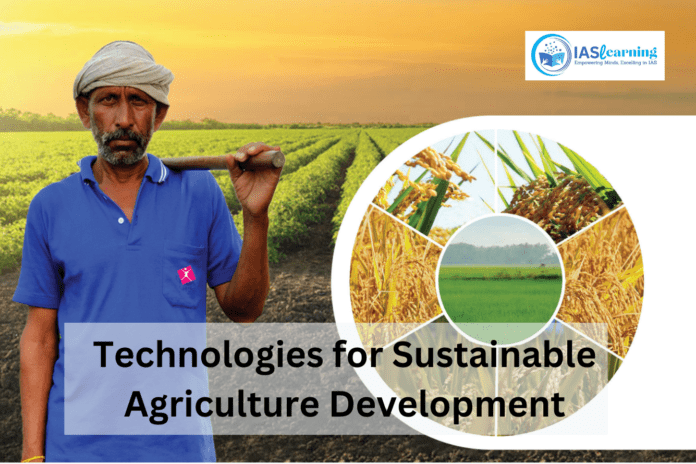Table of Contents
Introduction to Sustainable Agriculture Development
Agriculture, often termed the “backbone” of the Indian economy, holds a pivotal position in shaping the nation’s destiny. With more than half of its population engaged in farming, India’s agrarian sector is not just a source of livelihood but also an integral part of its cultural and social fabric. However, while agriculture’s historical significance is undeniable, the traditional methods employed in this sector have, over time, revealed their unsustainability, profoundly impacting both the environment and public health. Consequently, ensuring the long-term viability of agriculture in India demands a transformative shift towards sustainable agricultural practices.
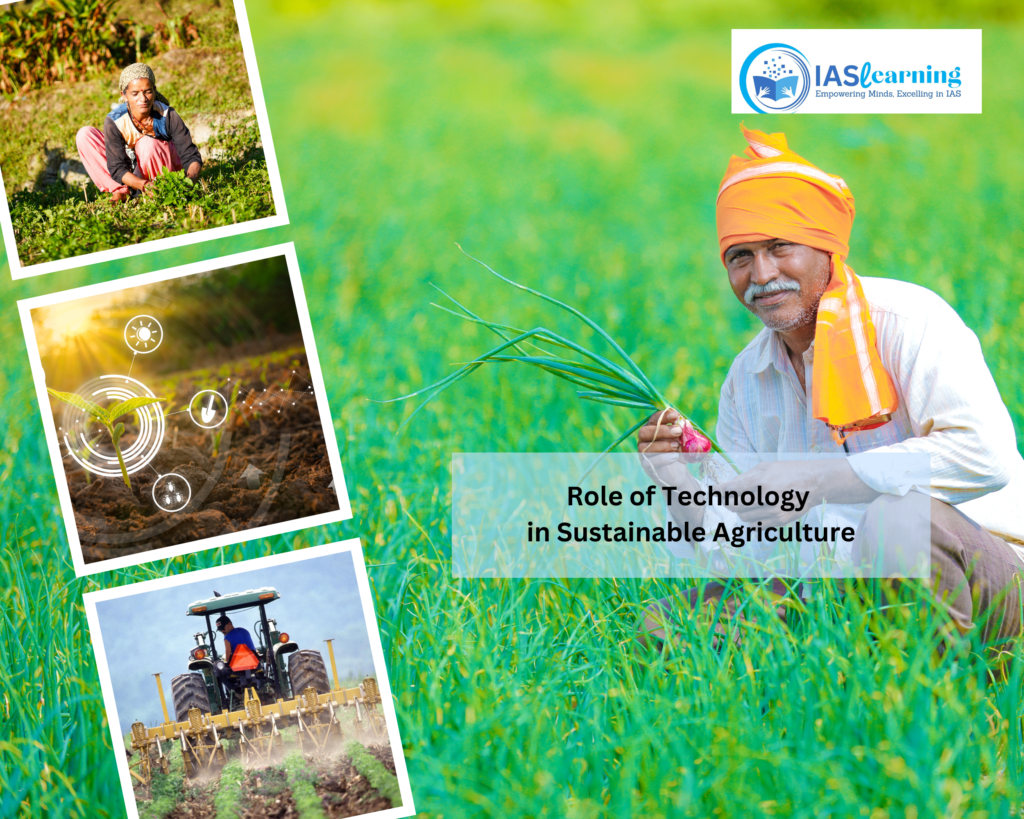
The significance of Sustainable Agriculture Development in India
The significance of agriculture in India is exemplified by the World Bank’s estimation that in the year 2020, 42.1% of the country’s workforce was employed in this sector. This reveals a staggering statistic: a substantial portion of the Indian population relies on agriculture for their sustenance and economic well-being. Yet, as India’s economic landscape evolves, with the growth of sectors like services and manufacturing, the percentage of the population employed in agriculture has been gradually decreasing. This shift is notable, particularly when compared to the year 2000 when 60.5% of the population worked in agriculture.
Importance of Sustainable Agriculture Development in India
- Agriculture is the backbone of the Indian economy, employing over half the population.
- Traditional agricultural practices have led to environmental and public health issues, necessitating a shift towards sustainability.
Employment and Economic Significance
- In 2020, 42.1% of Indians were employed in agriculture.
- Industry and services sectors contribute over 80% of the nation’s Gross Value Added (GVA).
- While the percentage of the population employed in agriculture has declined, it remains vital for many livelihoods.
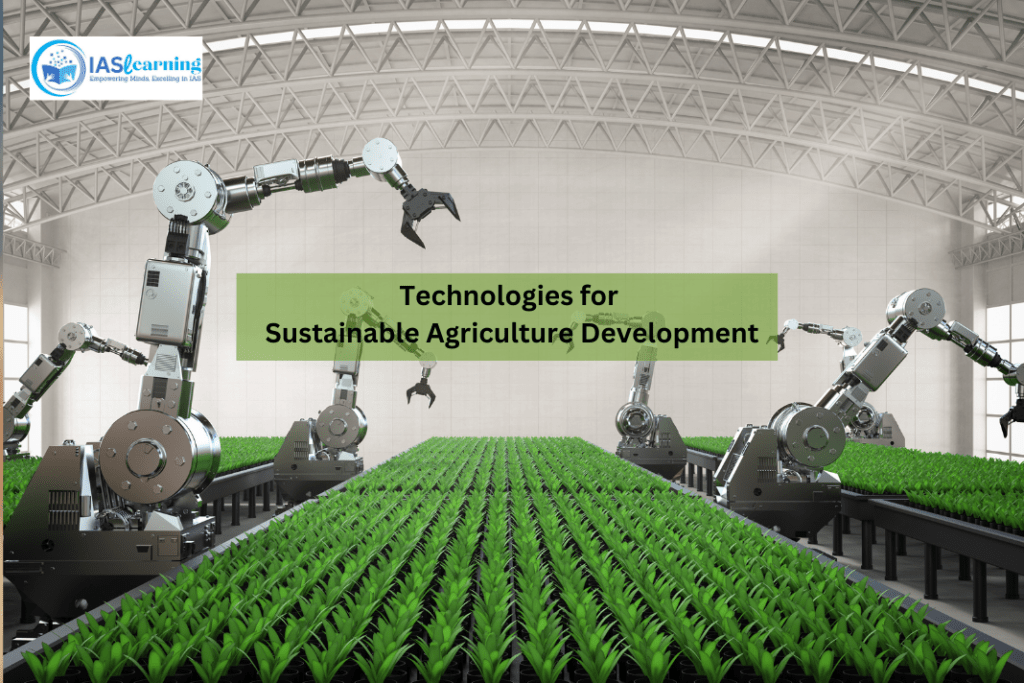
Role in GDP Growth in Sustainable Agriculture Development
- The agricultural sector’s contribution to per capita GDP in India has been decreasing.
- The Ministry of Statistics and Programme Implementation (MoSPI) forecasts a decline in the GVA of agricultural and allied sectors.
- Despite this decline, agriculture still plays a crucial role in terms of employment and livelihoods.
Government Initiatives towards Sustainable Agriculture Development
- The government has launched various programs like Pradhan Mantri Fasal Bima Yojana, Pradhan Mantri Krishi Sinchayee Yojana, and the National Agriculture Market (e-NAM) platform to promote agriculture.
- The Pradhan Mantri Fasal Bima Yojana (PMFBY) is a groundbreaking policy offering comprehensive risk solutions for farmers.
Sustainable Agriculture Development
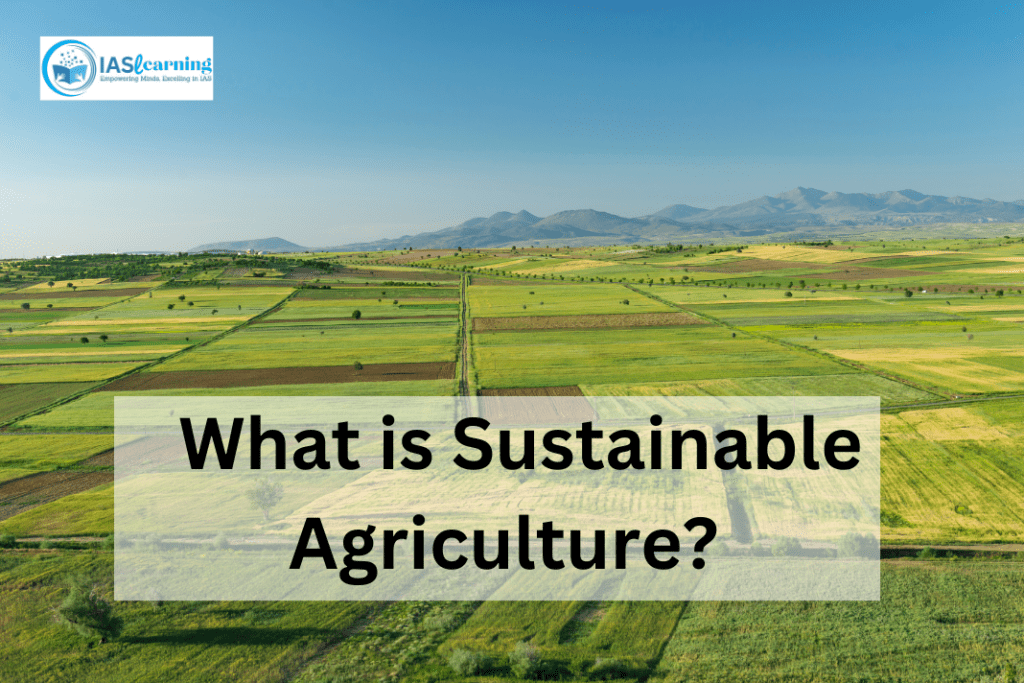
- Sustainable agriculture considers soil health, environmental preservation, and long-term community well-being.
- It aims to meet growing food demand while safeguarding natural resources.
- One of the significant challenges facing Indian farmers is declining soil fertility due to chemical use, making sustainable practices crucial.
Government Initiatives for Sustainable Agriculture Development
- The Indian government has recogsized the importance of sustainable agriculture and has implemented several initiatives and schemes to promote and support the adoption of sustainable farming practices. These initiatives aim to address various challenges in the agriculture sector while ensuring long-term environmental sustainability and food security. Here are some key government initiatives for sustainable agriculture in India:
- Paramparagat Krishi Vikas Yojana (PKVY)
- PKVY is a scheme under the National Mission for Sustainable Agriculture (NMSA).
- It promotes organic farming and the use of traditional and indigenous practices.
- Farmers are encouraged to adopt organic farming methods, reduce chemical inputs, and improve soil health.
- Financial support and training are provided to farmers to make the transition to organic farming.
- Soil Health Card Scheme
- The Soil Health Card Scheme aims to assess the nutrient status of soil and provide personalized recommendations to farmers.
- Soil health cards help farmers make informed decisions about nutrient management, reducing excessive use of fertilizers and enhancing soil fertility.
- Regular monitoring of soil health promotes sustainable farming practices.
- Rashtriya Krishi Vikas Yojana (RKVY)
- RKVY is a centrally sponsored scheme that supports various agricultural and horticultural activities.
- It focuses on increasing productivity, reducing post-harvest losses, and promoting sustainable agriculture.
- Funds are allocated to states to implement projects aimed at improving agricultural infrastructure and practices.
- Pradhan Mantri Fasal Bima Yojana (PMFBY)
- PMFBY is a groundbreaking crop insurance scheme that provides risk coverage and financial support to farmers.
- It helps farmers mitigate losses due to natural calamities and encourages them to invest in sustainable farming practices without the fear of financial setbacks.
- PMFBY has been instrumental in safeguarding farmers’ interests and promoting sustainable agriculture.
- Pradhan Mantri Krishi Sinchayee Yojana (PMKSY)
- PMKSY focuses on enhancing water use efficiency in agriculture through various irrigation methods.
- It promotes sustainable water management practices, including the development of water-efficient technologies and infrastructure.
- Improved irrigation facilities lead to better crop yields and reduced water wastage.
- National Agriculture Market (e-NAM) Platform
- e-NAM is an online platform that connects agricultural markets and enables electronic trading of agricultural commodities.
- It promotes transparency and efficiency in agricultural marketing, reducing the role of middlemen.
- Farmers get fair prices for their produce, encouraging sustainable practices.
- National Mission for Sustainable Agriculture (NMSA)
- NMSA is a comprehensive mission that encompasses various initiatives for promoting sustainability in agriculture.
- It focuses on soil health management, water use efficiency, and climate-resilient practices.
- NMSA plays a pivotal role in coordinating and implementing sustainable agricultural practices across the country.
- Integrated Watershed Management Programme
- This program aims to improve soil and water management practices in watersheds.
- It enhances water availability, reduces soil erosion, and promotes sustainable land use.
- Watershed management contributes to the overall sustainability of agricultural ecosystems.
- National Food Security Mission (NFSM)
- NFSM focuses on increasing the production of rice, wheat, pulses, and coarse cereals to ensure food security.
- Sustainable practices, including the use of high-yielding varieties and efficient resource management, are encouraged.
- The mission supports the sustainable growth of staple crops.
- Kisan Call Centre and mKisan Portal
- These initiatives provide farmers with access to agricultural information and expert advice.
- Farmers can get guidance on sustainable farming practices, pest management, and weather forecasts.
- Access to timely information helps farmers make informed decisions for sustainable agriculture.
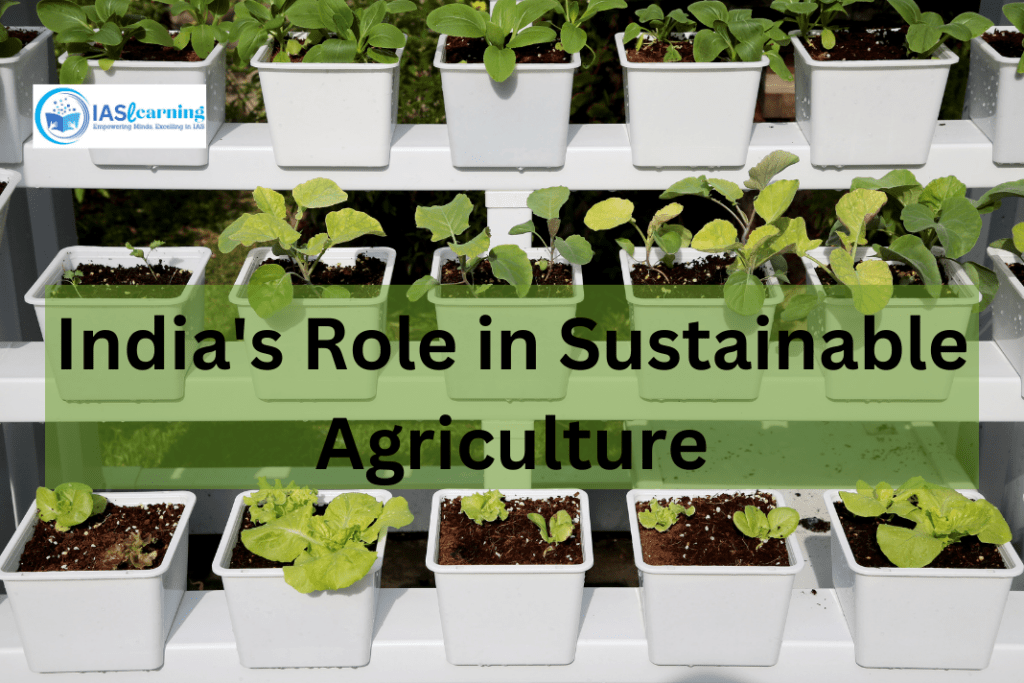
Role of Technology in Sustainable Agriculture
- Precision Farming involves sensors, GPS mapping, and data analytics to optimize crop performance.
- Agroforestry combines trees and shrubs with crops and livestock to create a more sustainable farming system.
- Vertical Farming and Hydroponics improve resource utilisation and reduce water consumption.
- Renewable Energy can power farming operations, reducing greenhouse gas emissions.
- Robotics and Automation can lower labor costs and enhance crop yields.
Challenges in Adopting Sustainable Agriculture
- Lack of Awareness and Knowledge among farmers.
- Limited Access to Finance for sustainable agriculture practices.
- Inadequate Policy and Regulatory Framework.
- Limited Research and Development for sustainable methods suitable for India.
- Lack of Infrastructure and Technical Support, including cold chains and storage facilities.
- Low Productivity in Indian agriculture due to factors like low mechanisation and poor soil health.
- Fragmented Landholdings making adoption of modern techniques challenging.
- Lack of Market Access for small and marginal farmers, leading to lower incomes.
- Climate Change poses challenges in water availability, pest management, and crop yields.
Agri Tech Start-ups
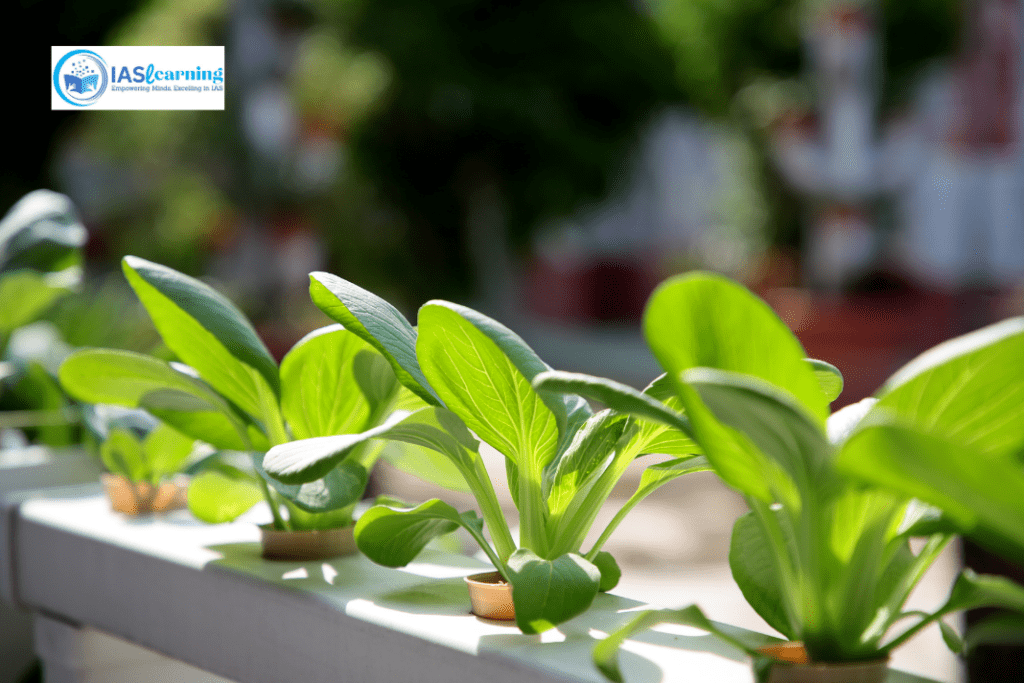
- AgriApp Technologies:
- Overview: AgriApp Technologies is a pioneering agricultural technology start-up that focuses on empowering farmers with high-efficiency technology-enabled agricultural production and marketing solutions.
- Sustainable Agriculture Contribution: AgriApp Technologies plays a crucial role in sustainable agriculture by providing farmers with digital tools and information that promote efficient resource management. This includes guidance on optimal planting times, crop rotation, and pest control, helping reduce the reliance on chemical inputs.
- Impact: The use of technology in agriculture not only improves crop yields but also minimizes the environmental impact of farming practices. By reducing the need for chemical fertilizers and pesticides, AgriApp Technologies contributes to a more sustainable and eco-friendly farming ecosystem.
- Khetee:
- Overview: Khetee is an agroecological start-up that focuses on promoting sustainable farming practices through the adoption of agroforestry models.
- Sustainable Agriculture Contribution: Khetee’s emphasis on agroecology and agroforestry aligns with sustainable agriculture principles. Agroforestry involves planting trees and shrubs alongside crops and livestock, creating a more sustainable and diversified farming system. This approach enhances soil health, conserves biodiversity, and sequesters carbon, contributing to long-term sustainability.
- Impact: By encouraging farmers to adopt agroecological farming techniques, Khetee contributes to mitigating the negative environmental impacts of traditional farming practices while also improving the resilience of farming communities.
- Pudhuvai Green Gas:
- Overview: Pudhuvai Green Gas is a start-up focused on producing organic waste agro-raw materials and bio-fertilizers.
- Sustainable Agriculture Contribution: Pudhuvai Green Gas addresses two critical aspects of sustainable agriculture: organic waste management and the production of natural fertilizers. By converting organic waste into bio-fertilizers, the start-up reduces the reliance on chemical fertilizers, which can harm soil health and the environment.
- Impact: The production and use of bio-fertilizers contribute to improved soil fertility, reduced chemical runoff, and enhanced overall sustainability in agriculture. Pudhuvai Green Gas’s efforts align with the goal of achieving more eco-friendly and sustainable farming practices in India.
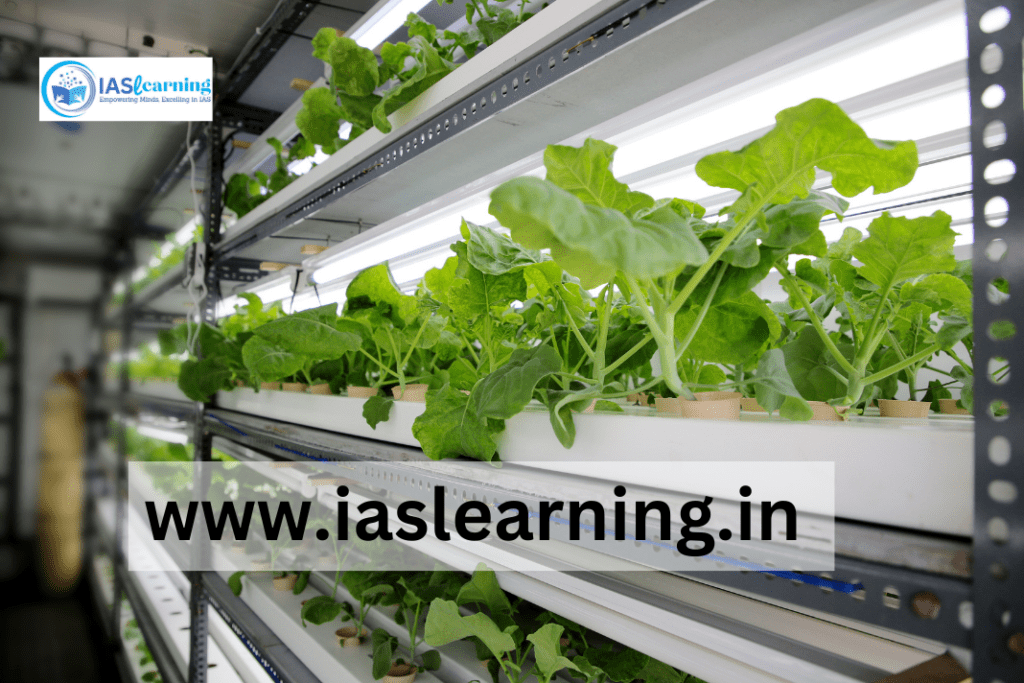
Conclusion
- Sustainable agriculture benefits farmers, the environment, and public health.
- It has the potential to increase agricultural productivity, lower production costs, and improve crop quality.
- Modern technologies are essential for achieving sustainability.
- A holistic approach combining multiple sustainable farming practices is necessary for the long-term success of Indian agriculture.

